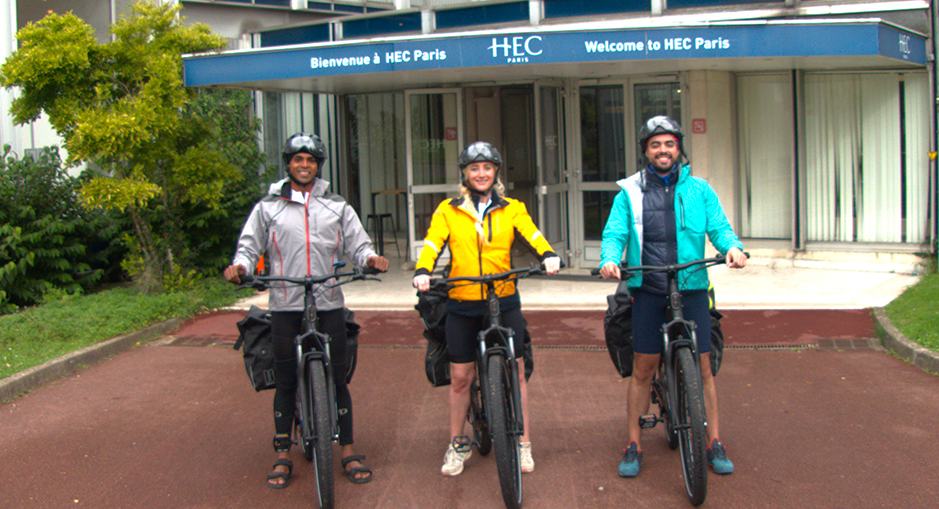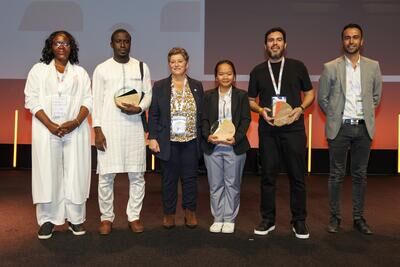 Actualités
Actualités 
HEC Graduate & Friends Pedal for a Sustainable Future: from Paris to Madrid on E-Bikes
Sushil Reddy, an HEC Paris alumnus from the Master of Sustainability and Social Innovation (SASI) and the organizer of the Paris-Madrid road trip, is no stranger to endurance journeys for a cause. As the founder of The SunPedal Ride, Reddy has been raising awareness about sustainable mobility for years. His previous expeditions include a Guinness World Record journey across India on a solar-powered e-bike in 2016, covering over 7,000 kilometers. In fact, this latest Paris-Madrid leg is a continuation of that journey, demonstrating how e-bikes can be a viable option for long-distance travel. It also has a scientific foundation designed to gather data and refine research on e-bikes.
At the outset of the trip, Reddy and his two fellow cyclists made a pit stop on the HEC campus to share their project with students and staff. “The idea is to promote electric mobility as a medium to travel longer distances, even across countries,” Reddy explained, his bike helmet solidly strapped to his head. “With Europe’s well-developed biking infrastructure, it’s the perfect place to show how e-bikes can be part of the solution to the climate crisis.” He paused, then said with insistence: “Our journey isn't just about going from A to B - it's about exploring, connecting, and transforming awareness about low carbon mobility. We’re using electric bikes as a medium. People still don’t realize that there are technologies out there that they can adopt today. They can travel longer distances thanks to the infrastructure in Europe for biking.”
The broader significance of this journey becomes clearer when considering the current state of global mobility. According to the International Energy Agency (IEA), transportation accounts for 24% of global carbon emissions, with road vehicles making up the bulk of that. Reddy’s mission is in line with global efforts to cut down emissions, and e-bikes are seen as a key part of that transition. A study by the European Cyclists’ Federation shows that replacing car trips with e-bike commutes could reduce CO2 emissions from urban transportation by as much as 50%.
Sushil Reddy pioneering awareness about low carbon mobility
From Awareness to Action
Joining Reddy on this expedition is Elaine Ford, an artist and wildlife biologist from Scotland who founded Electric Explorer, a startup mapping outdoor experiences while promoting sustainable travel. Ford’s work focuses on combining regenerative tourism with advanced mapping technology, pinpointing sites of ecological and cultural significance that can be visited sustainably.
In this journey, Ford has integrated data collection into the experience. “This trip allows us to map regenerative tourism sites and collect data on how e-bikes can enhance the travel experience while minimizing environmental impact,” she explained. Her work includes using e-mobility to promote regenerative tourism, which she defines as a form of travel that actively improves the places visited, whether by engaging in environmental projects or supporting local economies. “We’re not just passing through places; we’re engaging with them,” Ford emphasized.
Her Electric Explorer highlights how modern technology can enhance sustainable travel. Through their software, Ford’s team maps trails and nature sites specifically designed for electric travel, encouraging travelers to choose routes that not only reduce their carbon footprint but also allow them to contribute positively to local ecosystems. The data collected during the Paris-Madrid trip will be integrated into systems used by navigation and tourism platforms, making it easier for others to follow in their pedaling footsteps.
Ford’s background in immersive technology also adds a fascinating layer to the project. By incorporating virtual reality (VR) into her regenerative tourism efforts, Ford’s team offers digital experiences that can transport users to the very nature sites she visits. “We aim to inspire people who might not be able to travel to these locations to connect with the environment in a meaningful way,” Ford noted. Her VR projects have been exhibited at Burning Man and in Paris, further showcasing how art and science can combine to promote environmental stewardship.
Crossing Borders and Changing Minds
The third member of the team, Luis Fourzan, brings another unique expertise to the project. A lawyer by training, Fourzan has shifted his focus to renewable energy advocacy. He has previously collaborated with Reddy on e-mobility projects, including a massive 12,000-kilometer e-bike tour across the United States, one which also garnered a Guiness World Record in 2023. “We did the U.S. trip to show how e-bikes and solar power can be integrated, even in a car-centric country like the U.S.,” Fourzan said.
Fourzan’s advocacy extends to public policy. “The data we collect on these trips is shared with policymakers to push for more sustainable public policies, especially in cities,” he explained. In Europe, cities like Amsterdam and Copenhagen have already pioneered bike-friendly policies that reduce car use and promote public health. Fourzan hopes that by demonstrating the viability of long-distance e-bike travel, nations across the world, especially developing ones, will adopt similar measures.
In fact, cities across Europe are increasingly looking to e-bikes to reduce congestion and carbon emissions. Research from Navigant Research indicates that e-bike sales are expected to grow significantly in the coming decade as cities turn to low-carbon alternatives to combat pollution. In Paris, where this Paris-Madrid journey began, Mayor Anne Hidalgo has led an aggressive campaign to reduce car traffic, creating 1,000 kilometers of new bike lanes and banning cars from many central areas.
The Road Ahead: Challenges and Opportunities
While Europe’s infrastructure is well-equipped for cyclists, the team acknowledges that e-bike adoption faces challenges elsewhere. “In France, it’s quite easy to travel long distances by bike. But,” Reddy admitted, “in countries like India, where we have dense cities and high levels of air pollution, it’s much more complicated. We need more government support there for biking infrastructure, and the cultural shift will take time.” India’s pledge to achieve net-zero emissions by 2070 has spurred efforts to promote electric vehicles, including e-bikes, but the transition is slow. Despite these challenges, Reddy remains optimistic. In a previous project we chronicled, he highlighted the potential for retrofitting India’s iconic tuk-tuks with electric engines, which could significantly reduce urban pollution levels.
Back in Europe, Ford and Fourzan see a more immediate future for e-mobility. “We’re not waiting for 2070,” Ford said with a smile. “We’re showing that the future is already here. E-bikes are a low-carbon, low-impact way to travel, and they make sense for today’s world, especially with the rising cost of fossil fuels and the urgency of the climate crisis.”
Inspiring a Movement
As the team pedals through the French countryside, they continue to gather support for their cause. Sponsored by companies like Tenways and MONIN, their journey has attracted media attention and a growing following on social media. Their e-bikes, equipped with lightweight batteries, can travel over 50 kilometers on a single charge, demonstrating the practicality of long-distance travel on two wheels.
“In Limoges, we were hosted by members of the Warmshowers.org Foundation, who gave us a bike tour of the city,” Reddy later noted in his ongoing chronicle of the trip. “It’s been amazing to see how people have embraced what we’re doing.” He hopes their journey will inspire policymakers, researchers and individuals to rethink how they travel and consider the environmental impact of their choices.
With each pedal stroke, this team of scientific adventurers pushes toward a future that’s cleaner, greener, and more connected to the world around us.






Commentaires
Vous devez être connecté pour laisser un commentaire. Connectez-vous.